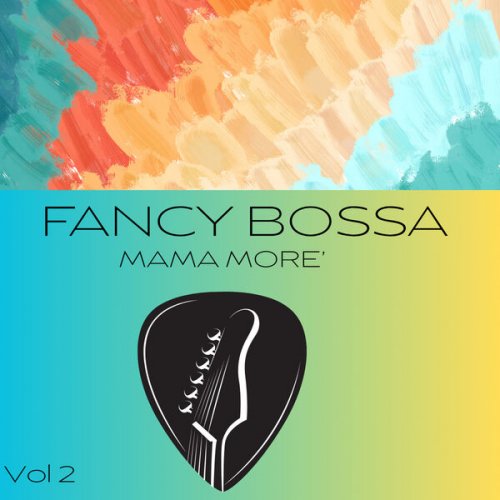Scottish Chamber Orchestra, Joseph Swenson - Mendelssohn: Violin Concerto & Symphony No. 3 (2002) [SACD]
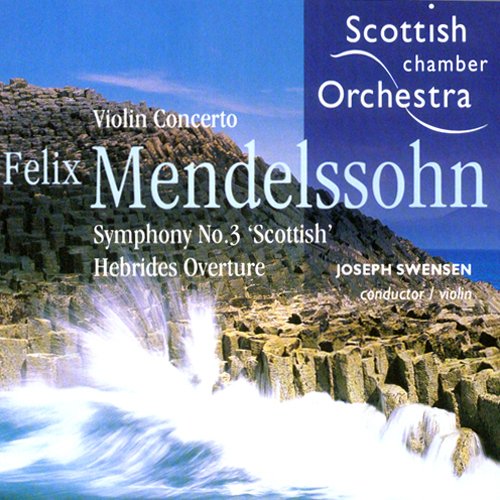
Artist: Scottish Chamber Orchestra, Joseph Swenson
Title: Mendelssohn: Violin Concerto & Symphony No. 3
Year Of Release: 2002
Label: Linn - CKD216
Genre: Classical
Quality: DSD64 image (*.iso) / 2.0, 5.1 (2,8 MHz/1 Bit)
Total Time: 71:39
Total Size: 4.21 GB
WebSite: Album Preview
Tracklist:Title: Mendelssohn: Violin Concerto & Symphony No. 3
Year Of Release: 2002
Label: Linn - CKD216
Genre: Classical
Quality: DSD64 image (*.iso) / 2.0, 5.1 (2,8 MHz/1 Bit)
Total Time: 71:39
Total Size: 4.21 GB
WebSite: Album Preview
1. Hebrides Overture
Violin Concerto in E minor
2. allegro molto appassionato, presto
3. andante, allegretto non troppo
4. allegro molto vivace
Symphony No. 3 in A minor “Scottish”
5. andante con moto, allegro un poco agitato
6. vivace non tropo
7. adagio
8. allegro vivacissimo. allegro maestoso assai
An exceptionally beautiful rcording of Mendelssohn, with violinist Joseph Swensen. “Lacks nothing in attack or passion but benefits in clarity of detail from the chamber size of the ensemble & the superb recording standards befitting this label” (The Observer).
This SACD was recorded at Edinburgh’s Usher Hall. The orchestra is led by its Principal Conductor Joesph Swensen, who also plays the solo part in the Violin Concerto.
Rather than being solely a composer, Felix Mendelssohn should be considered a polymath – educated and skilled in music, painting & drawing, languages, the classics, as well as being an accomplished sportsman, dancer & chess player. His musical accomplishments – of which composition was always the most important in his own eyes – also include performances as a virtuoso on the piano & organ, a gifted violinist, a conductor, & an administrator & editor who has left a legacy still respected & followed in the early 21st century.
Born in Hamburg, 3 February 1809, Felix was the 2nd child of Abraham & Lea Mendelssohn. Abraham was a successful banker in a firm he founded with his brother in Berlin, a city he & his family (including the children Fanny (born 1805), Felix, & another daughter, Rebecka (born 1811)) returned to in July 1811. A 4th child, Paul, was born in 1812. The family were well-off, & the children well educated. Felix & his sister Fanny received their initial musical education from their mother Lea, although others were called in to help polish the 2 prodigies. During a visit to Paris in 1816-7 the children received piano lessons from Marie Bigot, a player who was admired by both Haydn & Beethoven. Later musical lessons came from Ludwig Berger & then, at the Berlin Singakademie, with Carl Friedrich Zelter. Zelter was himself schooled & taught using instruction from Kirnberger’s Kunst des reinen Satzes in der Musik, written to disseminate the pedagogical method of J S Bach. Zelter probably commenced teaching the young Felix composition in mid-1819, the 1st datable composition performed on 11 December 1819.
Although not a performing prodigy in quite the same way as the young Mozart, family connections allowed much opportunity for the young Felix to meet & perform in front of leading European musicians including, at various times, Hummel, Spohr, Schelbe, Moscheles, Cherubini, Kreutzer & Rossini.
When still in his mid-teens, Mendelssohn was given a copy of Bach’s St Matthew Passion, a work which (after years of preparation) he revived in a celebrated performance at the Berlin Singakademie in March 1829. By this time Felix was known as a gifted composer whose works were regularly being performed – his Midsummer Night’s Dream was premièred in early 1827 at a concert which also included the composer playing one of the solo parts in his Double Piano Concerto in Ab. The earliest of his Lieder ohne Worte was written, as a birthday present for his sister Fanny, in 1828.
1829 also saw Felix embark on what can best be described as a Grand Tour. Shortly after the performances of the St Matthew’s Passion Mendelssohn left for Hamburg, & following a difficult crossing of the English Channel he arrived in London on April 21. Initially remaining in London, often performing at private gatherings (although he did conduct his overture to Midsummer Night’s Dream on Midsummer’s Day), Felix left London in late July to visit Scotland for a walking tour. It was at an assembly of bagpipe musicians at Holyrood Palace, Edinburgh, that the inspiration for the opening of the Scottish Symphony (No. 3) came to him, & within 2 weeks he had the genesis of his Hebrides overture, which came to him while looking out at the Hebrides. A letter written to his family, dated August 7, 1829, includes the opening bars of the 1st theme in score. Although intimately connected with the work, it was not until the following day that Mendelssohn visited Fingal’s Cave on the island of Staffa.
Despite being capable of writing fast when it was required of him, Mendelssohn was at heart a constant reviser of his own works. The 1st draft of the Hebrides overture was competed in Rome during a visit in the winter of 1830-1, but the work was not completed & performed until mid-1832. In the case of the Scottish Symphony work was even slower, the piece not being completed & performed until 1842. Part of the delay with the latter piece can be directly attributed to his other activities. From 1833, still in his early 20s, Mendelssohn held a series of musical posts, including those of Music Director in Düsseldorf &, from 1835, Musical Director in Leipzig, where his duties included conducting the Gewandhaus orchestra. In 1838 he directed a series of 4 “historical concerts”, featuring performances of music composed up to 100 years earlier. A similar series in 1841 featured 5 concerts, the 1st of which featured the music of Bach & Handel, & the last having music by contemporary composers. Although not the 1st, Mendelssohn conducted with a baton, & it is here that the orchestral concert programme of today has its earliest foundations.
Mendelssohn’s later life saw an increased workload, often dividing his time between a newly-created (although undefined) post in Berlin, & his position in Leipzig. He was also involved in the creation of the Music Conservatory in Leipzig, heading a staff which also included Robert Schumann, Ignaz Moscheles, Ferdinand David, Moritz Hauptmann, & later Niels Gade. As his workload increased, so did his frustration at the lack of time available to pursue his favourite activity – composition. The Scottish Symphony was finished in January 1842, & received its première on March 3 of that year. His one true compositional masterpiece of his last years is his Violin Concerto in E minor, op. 64, written for Ferdinand David, & premièred in Leipzig (conducted by Niels Gade) on March 13, 1845. He never managed to free himself of other commitments – a commission from the London Handel Society to edit Isreal in Egypt resulted in the 1st “modern” published edition – Mendelssohn clearly differentiating between the written marks of the composer & Mendelssohn’s own suggestions. The following year his edition of Bach’s organ works used similar practices.
The depression (for that is what a modern physician may well call it) in his later years never escaped Mendelssohn. Whereas Mozart suffered poverty, Beethoven deafness & Schumann madness, Felix suffered as a result of his great success, something familiar to the people of the 21st century. He died, months after his beloved sister Fanny, following a stroke on October 29, 1847, aged only 38.
D. Martin, Edinburgh, September 2002
This SACD was recorded at Edinburgh’s Usher Hall. The orchestra is led by its Principal Conductor Joesph Swensen, who also plays the solo part in the Violin Concerto.
Rather than being solely a composer, Felix Mendelssohn should be considered a polymath – educated and skilled in music, painting & drawing, languages, the classics, as well as being an accomplished sportsman, dancer & chess player. His musical accomplishments – of which composition was always the most important in his own eyes – also include performances as a virtuoso on the piano & organ, a gifted violinist, a conductor, & an administrator & editor who has left a legacy still respected & followed in the early 21st century.
Born in Hamburg, 3 February 1809, Felix was the 2nd child of Abraham & Lea Mendelssohn. Abraham was a successful banker in a firm he founded with his brother in Berlin, a city he & his family (including the children Fanny (born 1805), Felix, & another daughter, Rebecka (born 1811)) returned to in July 1811. A 4th child, Paul, was born in 1812. The family were well-off, & the children well educated. Felix & his sister Fanny received their initial musical education from their mother Lea, although others were called in to help polish the 2 prodigies. During a visit to Paris in 1816-7 the children received piano lessons from Marie Bigot, a player who was admired by both Haydn & Beethoven. Later musical lessons came from Ludwig Berger & then, at the Berlin Singakademie, with Carl Friedrich Zelter. Zelter was himself schooled & taught using instruction from Kirnberger’s Kunst des reinen Satzes in der Musik, written to disseminate the pedagogical method of J S Bach. Zelter probably commenced teaching the young Felix composition in mid-1819, the 1st datable composition performed on 11 December 1819.
Although not a performing prodigy in quite the same way as the young Mozart, family connections allowed much opportunity for the young Felix to meet & perform in front of leading European musicians including, at various times, Hummel, Spohr, Schelbe, Moscheles, Cherubini, Kreutzer & Rossini.
When still in his mid-teens, Mendelssohn was given a copy of Bach’s St Matthew Passion, a work which (after years of preparation) he revived in a celebrated performance at the Berlin Singakademie in March 1829. By this time Felix was known as a gifted composer whose works were regularly being performed – his Midsummer Night’s Dream was premièred in early 1827 at a concert which also included the composer playing one of the solo parts in his Double Piano Concerto in Ab. The earliest of his Lieder ohne Worte was written, as a birthday present for his sister Fanny, in 1828.
1829 also saw Felix embark on what can best be described as a Grand Tour. Shortly after the performances of the St Matthew’s Passion Mendelssohn left for Hamburg, & following a difficult crossing of the English Channel he arrived in London on April 21. Initially remaining in London, often performing at private gatherings (although he did conduct his overture to Midsummer Night’s Dream on Midsummer’s Day), Felix left London in late July to visit Scotland for a walking tour. It was at an assembly of bagpipe musicians at Holyrood Palace, Edinburgh, that the inspiration for the opening of the Scottish Symphony (No. 3) came to him, & within 2 weeks he had the genesis of his Hebrides overture, which came to him while looking out at the Hebrides. A letter written to his family, dated August 7, 1829, includes the opening bars of the 1st theme in score. Although intimately connected with the work, it was not until the following day that Mendelssohn visited Fingal’s Cave on the island of Staffa.
Despite being capable of writing fast when it was required of him, Mendelssohn was at heart a constant reviser of his own works. The 1st draft of the Hebrides overture was competed in Rome during a visit in the winter of 1830-1, but the work was not completed & performed until mid-1832. In the case of the Scottish Symphony work was even slower, the piece not being completed & performed until 1842. Part of the delay with the latter piece can be directly attributed to his other activities. From 1833, still in his early 20s, Mendelssohn held a series of musical posts, including those of Music Director in Düsseldorf &, from 1835, Musical Director in Leipzig, where his duties included conducting the Gewandhaus orchestra. In 1838 he directed a series of 4 “historical concerts”, featuring performances of music composed up to 100 years earlier. A similar series in 1841 featured 5 concerts, the 1st of which featured the music of Bach & Handel, & the last having music by contemporary composers. Although not the 1st, Mendelssohn conducted with a baton, & it is here that the orchestral concert programme of today has its earliest foundations.
Mendelssohn’s later life saw an increased workload, often dividing his time between a newly-created (although undefined) post in Berlin, & his position in Leipzig. He was also involved in the creation of the Music Conservatory in Leipzig, heading a staff which also included Robert Schumann, Ignaz Moscheles, Ferdinand David, Moritz Hauptmann, & later Niels Gade. As his workload increased, so did his frustration at the lack of time available to pursue his favourite activity – composition. The Scottish Symphony was finished in January 1842, & received its première on March 3 of that year. His one true compositional masterpiece of his last years is his Violin Concerto in E minor, op. 64, written for Ferdinand David, & premièred in Leipzig (conducted by Niels Gade) on March 13, 1845. He never managed to free himself of other commitments – a commission from the London Handel Society to edit Isreal in Egypt resulted in the 1st “modern” published edition – Mendelssohn clearly differentiating between the written marks of the composer & Mendelssohn’s own suggestions. The following year his edition of Bach’s organ works used similar practices.
The depression (for that is what a modern physician may well call it) in his later years never escaped Mendelssohn. Whereas Mozart suffered poverty, Beethoven deafness & Schumann madness, Felix suffered as a result of his great success, something familiar to the people of the 21st century. He died, months after his beloved sister Fanny, following a stroke on October 29, 1847, aged only 38.
D. Martin, Edinburgh, September 2002
![Scottish Chamber Orchestra, Joseph Swenson - Mendelssohn: Violin Concerto & Symphony No. 3 (2002) [SACD]](https://www.dibpic.com/uploads/posts/2021-04/1618996077_back.png)
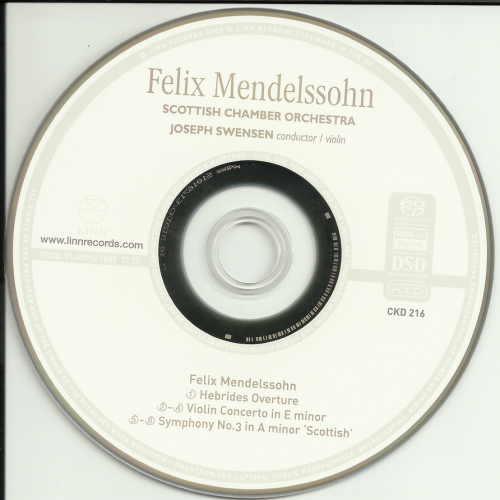

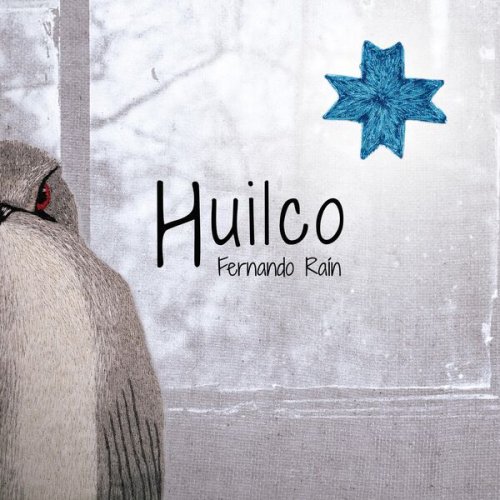
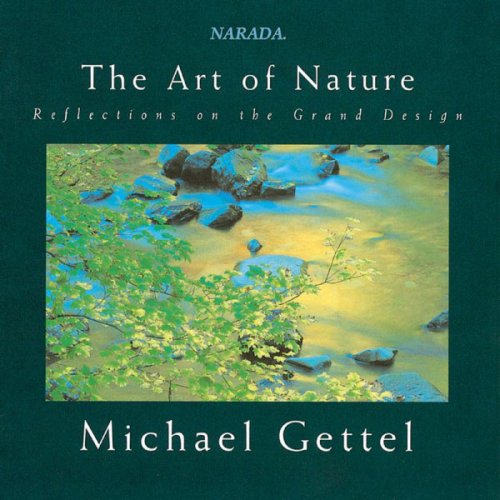
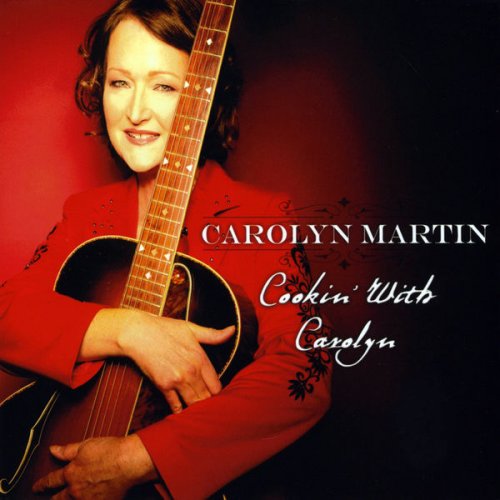

![Tomasz Stańko - Piece for Diana and Other Ballads (Polish Radio Sessions vol. 1/6) (2025) [Hi-Res] Tomasz Stańko - Piece for Diana and Other Ballads (Polish Radio Sessions vol. 1/6) (2025) [Hi-Res]](https://www.dibpic.com/uploads/posts/2025-12/1765788761_cover.jpg)
![NYO Jazz - Live in Johannesburg (Live) (2025) [Hi-Res] NYO Jazz - Live in Johannesburg (Live) (2025) [Hi-Res]](https://www.dibpic.com/uploads/posts/2025-12/1765894703_zwp14vk90corb_600.jpg)

